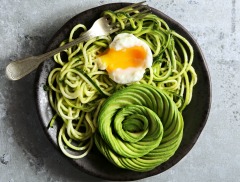Don't just meal plan... meal plan intelligently - with Meal Genius! Sign up for our free newsletter to get delicious recipes, sample meal plans and a whole lot more!
Kale
Kale is a member of the cancer-fighting cruciferous family of vegetables.
Along with being an excellent source of antioxidant nutrients beta-carotene and vitamin C, kale is also packed with cell-protecting glucosinolates and sulforaphane, as well as sight-saving lutein.
Kale can be prepared in numerous ways-from lightly sauteeing with lemon and extra virgin olive oil to adding fresh to a chopped salad.
The Benefits
- Special diets: Autoimmune Paleo Diet, Elimination Diet, Gluten-Free Diet, Gluten-Free/Dairy-Free Diet, Grain-Free Diet, Low Acid Diet, Low FODMAP Diet, Low Histamine Diet, Low Oxalate Diet, Low Starch Diet, Paleo Diet (Light), Paleo Diet (Strict), Pescetarian Diet, Primal Diet, Vegetarian Diet, Whole Food
- Excellent Source of: VitaminA, VitaminC, VitaminK, Manganese
- Good Source of:
- Preferences: No Fish, No Red Meat, No Pork, No Eggs, No Shellfish, No Gluten, No Nuts, No Seeds, No Soy, No Dairy, No Poultry, No Molds, No Citrus, No Pseudograins, No Coconut, No Nightshade, No Corn, No Yeast, No Peanuts, No Legumes, No Grains, Low Carbohydrate, Low Cholesterol, Low Fat, Low Sodium, Low Sugars, Low Saturated Fat
Related Foods
Related Recipes
Related Nutrients
Selecting and Storing
Choose kale with small-leaves to ensure tenderness. Select moist, crisp, unblemished kale with thick, plump stems. Kale is best used within a day or two.









